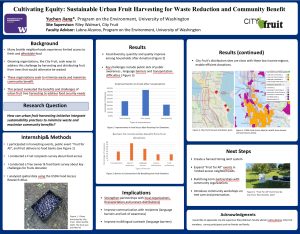Cultivating Equity: Sustainable Urban Fruit Harvesting for Waste Reduction & Community Benefit
Urban fruit harvesting (UFH) initiatives play an increasingly important role in creating sustainable, community-based food systems. These programs recover surplus fruit from residential trees and public orchards that would otherwise go to waste, redistributing it to local food banks and mutual aid networks. However, sustainability practices within UFH are often underdeveloped, limiting their potential to reduce waste and enhance community wellbeing. The purpose of this study was to identify strategies that integrate environmental and social sustainability into urban fruit harvesting systems to minimize waste and maximize community benefit. To accomplish this goal, I completed an internship with City Fruit, a Seattle-based nonprofit organization that harvests and redistributes urban fruit. Research methods included field observations of harvesting and distribution practices and surveys of City Fruit’s cooperators, including community partners, volunteers, and local organizations. In addition, I utilized the USDA’s Food Access Research Atlas to identify food deserts and analyze how City Fruit’s operations align with areas of limited food access. Results show that improved ripeness tracking, equitable donation networks, and partnerships with organizations in high-vulnerability areas significantly increased food accessibility and community engagement. Findings emphasize the importance of data-driven strategies and collaborative networks in advancing food justice. Integrating sustainability practices within UFH demonstrates the potential for local organizations to strengthen community resilience and contribute to more equitable and circular food systems.
